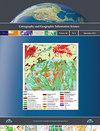异构地形数据在离散全球网格系统中的集成
IF 2.4
3区 地球科学
Q1 GEOGRAPHY
Cartography and Geographic Information Science
Pub Date : 2021-09-02
DOI:10.1080/15230406.2021.1966648
引用次数: 8
摘要
加拿大自然资源部发布的加拿大数字高程模型(CDEM)和高分辨率数字高程模型(HRDEM)是加拿大的主要地形数据源。由于它们的覆盖范围、基准、分辨率和精度不同,需要一个跨不同比例尺的国家高程数据的标准化框架。该研究为采用离散全球网格系统(DGGS)促进不同粒度的多源地形数据集成提供了新的见解。特别采用二十面体Snyder等面积孔径3六边形网格(ISEA3H),并在此框架上进行量化、积分和聚合。为了演示建模过程,在安大略省的两个地区进行了一个实验,利用并行计算的优势,这有利于DGGS单元的离散性。通过参考地面测量值估算模型高程的精度,并将其作为数据质量的指标纳入空间引用元数据中。该研究可为未来国家高程服务的发展提供指导,提供一致的、多分辨率的高程,避免用户端复杂的、重复的预处理。建议将来研究支持现实世界决策的操作集成平台,以及dggs驱动的地理空间数据集。本文章由计算机程序翻译,如有差异,请以英文原文为准。
Integration of heterogeneous terrain data into Discrete Global Grid Systems
ABSTRACT The Canadian Digital Elevation Model (CDEM) and the High-Resolution Digital Elevation Model (HRDEM) released by Natural Resources Canada are primary terrain data sources in Canada. Due to their different coverage, datums, resolutions, and accuracies, a standardized framework for national elevation data across various scales is required. This study provides new insights into the adoption of Discrete Global Grid Systems (DGGS) to facilitate the integration of multi-source terrain data at various granularities. In particular, the Icosahedral Snyder Equal Area Aperture 3 Hexagonal Grid (ISEA3H) was employed, and quantization, integration, and aggregation were conducted on this framework. To demonstrate the modeling process, an experiment was undertaken for two areas in Ontario, taking advantage of parallel computing which was beneficial from the discreteness of DGGS cells. The accuracy of the modeled elevations was estimated by referring to the ground-surveyed values and was included in the spatially referenced metadata as an indicator of data quality. This research can serve as a guide for future development of a national elevation service, providing consistent, multi-resolution elevations and avoiding complex, duplicated pre-processing at the user’s end. Future investigation into an operational integration platform to support real-world decision-making, as well as the DGGS-powered geospatial datacube, is recommended.
求助全文
通过发布文献求助,成功后即可免费获取论文全文。
去求助
来源期刊
CiteScore
5.20
自引率
20.00%
发文量
23
期刊介绍:
Cartography and Geographic Information Science (CaGIS) is the official publication of the Cartography and Geographic Information Society (CaGIS), a member organization of the American Congress on Surveying and Mapping (ACSM). The Cartography and Geographic Information Society supports research, education, and practices that improve the understanding, creation, analysis, and use of maps and geographic information. The society serves as a forum for the exchange of original concepts, techniques, approaches, and experiences by those who design, implement, and use geospatial technologies through the publication of authoritative articles and international papers.

 求助内容:
求助内容: 应助结果提醒方式:
应助结果提醒方式:


